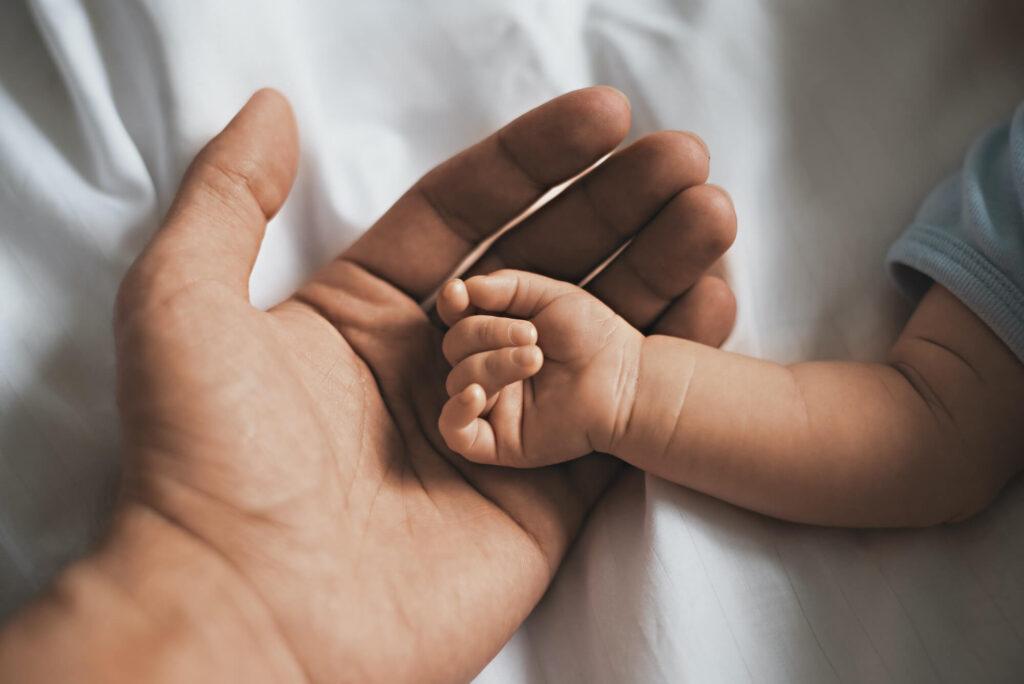Written By: Angela Bishop
Becoming a parent is often hailed as one of life’s most beautiful and transformative experiences. However, hidden beneath the glow of newborn joy, fathers can find themselves grappling with an unexpected and often overlooked challenge: postpartum depression (PPD). Let’s dive into the complex world of postpartum depression (PPD) in fathers, a topic that is frequently overshadowed by its counterpart in mothers. We will look at breaking down the stigma, sharing personal stories, and offering guidance for those who find themselves navigating these uncharted emotional waters.
Understanding the Emotional Landscape:
Postpartum depression in fathers is a nuanced and complex issue that has long been overshadowed by the more widely recognized maternal experience. While commonly associated with mothers, the truth is that fathers can also find themselves grappling with its weighty presence. The emotional whirlwind that descends upon new fathers is, at times, as intense as the hormonal storm experienced by mothers. The arrival of a new life brings joy, but it also ushers in a wave of responsibility, sleepless nights, and a sense of profound change.

The symptoms of paternal PPD can manifest in various ways, including persistent sadness, irritability, changes in appetite, difficulty concentrating, and a pervasive sense of hopelessness. The emotional rollercoaster that often accompanies fatherhood can intensify these feelings, leaving many men feeling lost and overwhelmed.
The Isolation and Stigma:
One of the first challenges fathers with postpartum depression face is the isolation that often accompanies their struggle. Society’s expectations of fathers being the stoic, unwavering support can create a stifling environment where admitting vulnerability feels like a betrayal of masculinity. The stigma surrounding men’s mental health can cast a shadow over their willingness to seek help, leading many to suffer in silence.
The Weight of Guilt and Shame:
Imagine standing at the threshold of fatherhood, gazing into the eyes of your newborn, and feeling not only immense love but also an inexplicable sense of sadness and despair. This is the reality for fathers experiencing postpartum depression. The guilt that accompanies these conflicting emotions can be overwhelming, leading to a cycle of shame and self-blame. Fathers may question their ability to provide and protect, further exacerbating the emotional turmoil. Society often places unrealistic expectations on men to be stoic providers and unwavering pillars of strength, especially during significant life transitions like the birth of a child. Admitting vulnerability and seeking help can be perceived as a betrayal of these societal norms, leading to a profound sense of shame for many fathers.
Personal Stories: A Glimpse into the Depths:
To truly understand the impact of paternal postpartum depression, it’s essential to hear the voices of those who have walked this challenging path. John, a 35-year-old father of two, shares his experience:
“Nobody really talks about how hard it can be for dads after the baby arrives. I felt this overwhelming responsibility to be the perfect dad and partner. But inside, I was drowning. I couldn’t shake this constant feeling of sadness, and it was like I was watching life from the sidelines. I felt detached from my own family, and the guilt of not being the father I thought I should be only made things worse.”
The Stigma Men Feel:

The stigma surrounding mental health issues, particularly in men, exacerbates the struggles faced by fathers dealing with postpartum depression. Men are often conditioned to believe that vulnerability is a sign of weakness, and seeking help is an admission of failure. This stigma can prevent fathers from acknowledging their pain, leading to a cycle of isolation and despair.
Breaking the Silence:
It’s crucial for fathers to recognize that postpartum depression is not a sign of weakness or failure. It is an emotional response to a life-altering event, and acknowledging the struggle is the first step towards healing. Breaking the silence is an act of bravery, a testament to the strength required to confront vulnerability head-on.
Recommendations for Fathers:
- Open Communication: Foster open and honest communication with your partner. Share your feelings and concerns, and encourage them to do the same. Building a support system within your family is a crucial step in navigating the challenges of postpartum depression. Establishing a safe space to express fears and vulnerabilities can be a crucial first step in breaking down the walls of isolation.
- Educate Yourself and Your Support System: Understanding postpartum depression, its symptoms, and the potential impact on fathers is essential. This knowledge empowers fathers to recognize when they need help and enables their support system to offer informed assistance.
- Practice Self Compassion: Be kind to yourself and allow time to heal.
- Seek Professional Help: Just as physical health requires the expertise of a doctor, mental health deserves the same attention. Seek out a mental health professional experienced in working with fathers dealing with postpartum depression. Therapy can provide a safe space to explore and address these complex emotions.
- Self-Care Rituals: Incorporate self-care rituals into your daily routine. Whether it’s a short walk, meditation, or a moment to indulge in a hobby, taking time for yourself is not selfish but essential for maintaining emotional well-being.
- Share the Load: Parenting is a team effort, and acknowledging that both partners share the responsibility can alleviate some of the immense pressure fathers often feel. Sharing childcare duties and emotional support can foster a more balanced and connected family dynamic.
- Challenge Societal Expectations: It’s time to challenge the outdated narrative that portrays men as emotionless providers. By embracing vulnerability and authenticity, fathers can redefine societal expectations and contribute to a more compassionate and understanding culture.

- Connect with Other Fathers: Joining support groups or connecting with other fathers who have experienced postpartum depression can be profoundly beneficial. Knowing that you are not alone in your journey can provide a sense of camaraderie and understanding.
To the fathers navigating the stormy seas of postpartum depression, know that your struggle is valid, and seeking help is not a sign of weakness. Paternal postpartum depression is a silent storm that rages within the hearts of many fathers, threatening to drown them in a sea of guilt, shame, and isolation. By shedding light on this often overlooked issue, we hope to break down the stigma and foster a community where fathers can find the support and understanding they need. It is a journey that requires courage, vulnerability, and a willingness to challenge societal norms. Together, let us rewrite the narrative surrounding paternal mental health, creating a space where fathers can navigate the tumultuous seas of parenthood with strength, resilience, and, above all, compassion for themselves.
If you are experiencing these emotions and feeling silenced and misunderstood, please reach out to Bloom & Thrive Therapy. We can help you navigate this difficult time.








